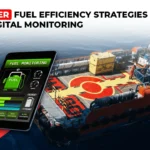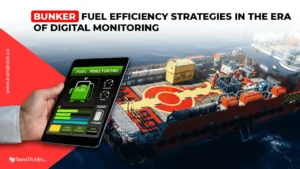Here’s Why Ship Maintenance Needs to Be Done Regularly!
Posted on June 4, 2024 by Nur Wachda Mihmidati

Taking good care of a vessel is an important aspect that should not be overlooked by ship owners and operators. Like any other vehicle, vessels require regular attention and maintenance to ensure optimal performance, crew safety, and operational sustainability. Regularly performed vessel maintenance not only helps prevent unexpected breakdowns, but can also extend the life of the vessel, reduce repair costs, and improve efficiency and safety at sea. In this article TransTRACK, we will discuss the different types of vessel maintenance and why regular maintenance is essential to ensure vessels remain in their best condition.
How to Maintain a Boat
Maintaining a ship requires attention to various technical and hygiene aspects to keep the ship in optimal condition and safe to use. The following are ways to maintain the ship:
1. Inspecting the Vessel Routinely
Regularly inspecting a vessel is essential to detect early damage or wear and tear before it becomes a major problem. Routine inspections include the deck, hull, and interior of the vessel. Check the deck for cracks, leaks, or other damage and ensure there is no standing water that could cause weathering. Check the hull to ensure there are no signs of rust, corrosion, or cracking. A well-maintained hull maintains the stability and safety of the vessel. Ensure that all parts of the vessel, including cabins and engine rooms, are in good condition by checking for leaks or damage to furniture.
2. Proper Lubrication
Lubrication is an important part of boat maintenance that ensures all moving parts function properly and do not wear out quickly. Ensure that all hinges, pulleys and other mechanical components are adequately lubricated. Use lubricants in accordance with the vessel or component manufacturer’s recommendations to prevent damage from using the wrong lubricant. Proper lubrication can extend component life and maintain optimal vessel performance.
3. Regular Cleaning
Cleaning the boat regularly helps prevent the buildup of dirt and rust that can damage the boat. Clean the deck, hull and interior of the boat regularly. Use cleaning agents that do not damage the vessel’s materials to maintain its integrity. Good hygiene also helps identify potential problems early and maintains the aesthetic appearance of the vessel.
4. Checking the Paint Coating Stays Perfect
The paint layer on a boat acts as a protective barrier against corrosion and damage from the harsh marine environment. Check the condition of the paint regularly and make repairs if there are cracks or peeling. Ensure that the paint used matches the vessel’s specifications and is resistant to seawater. Good paint maintenance ensures long-term protection and reduces future repair costs.
5. Checking the Engine
The ship’s engine requires special attention as it is the heart of the ship’s operations. Perform regular engine checks, including oil, filter and coolant checks. Make sure there are no leaks and that engine components are in good condition. Replace worn or damaged engine components according to the maintenance schedule to prevent further damage. Good engine maintenance ensures the vessel continues to operate efficiently and safely.
6. Routinely Check Navigation and Communication Systems
Navigation and communication systems are essential for safe sailing. Ensure all navigation and communication devices are in good working order and perform calibrations and software updates as necessary. Regular inspections of these devices help avoid navigation errors and ensure smooth communication during the journey. With well-maintained navigation and communication systems, the risk of accidents can be minimized.
7. Using Safety Equipment When Maintaining a Ship
Safety during ship maintenance should not be ignored. Always use personal protective equipment (PPE) such as gloves, goggles, and helmets when performing maintenance. Ensure fire extinguishers and other emergency equipment are always ready to use and in good condition. Using safety equipment protects you from injury and ensures a safe working environment on board.
Types of Ship Maintenance
Taking good care of a ship requires understanding and performing different types of maintenance. The following is an explanation of three common types of ship maintenance: preventive maintenance, predictive maintenance, and corrective maintenance.
Preventive Maintenance
Preventive maintenance is carried out on a regular and scheduled basis to prevent damage before it occurs. The aim is to ensure all components of the vessel are functioning properly and avoid unexpected breakdowns. Examples include regular inspections, periodic lubrication, component checking and replacement, and regular cleaning.
Predictive Maintenance
Predictive maintenance involves real-time monitoring of the vessel’s condition and using the data to predict when components are likely to fail. This allows repairs to be made just before damage occurs, reducing downtime and repair costs. Examples include vibration monitoring, oil analysis, use of diagnostic systems, and thermal checks.
Corrective Maintenance
Corrective maintenance is corrective action taken after damage or malfunction occurs. The aim is to repair damaged components or systems so that the vessel can operate normally again. Examples include engine repairs, replacement of damaged components, and system restoration.
Reasons Ship Maintenance Needs to Be Performed Regularly
Here are the reasons why ship maintenance itself needs to be done regularly:
Reduced Repair Costs
Regular maintenance helps detect and fix minor issues before they become major, reducing costly repairs and the risk of operational downtime.
Extends Ship Life
Proper maintenance extends vessel life by keeping components and systems in optimal condition, reducing wear and tear, and maintaining vessel value.
Improving Safety
Regular inspections and maintenance ensure all vessel safety systems are functioning properly, reducing the risk of accidents and ensuring the safety of crew and cargo.
Increased Effectiveness
A well-maintained vessel operates more efficiently, reduces fuel consumption, and improves overall performance, which supports productivity and a smooth operational schedule.
By performing regular maintenance, shipowners can ensure the vessel operates efficiently, safely, and over a longer period of time, thus optimizing the investment in the vessel.
Regular and proper vessel maintenance is essential to ensure your vessel remains in optimal, safe and efficient condition. By carrying out preventive, predictive, and corrective maintenance, you can reduce repair costs, extend vessel life, improve safety, and increase operational effectiveness. Don’t let your vessel face the risk of damage that can be avoided with good maintenance.
To support your boat maintenance with advanced technology, consider using TransTRACK’s Hybrid GPS Hybrid GPS. This system combines a satellite network and a Global SIM Card to ensure strong signal coverage, even in hard-to-reach high seas. With TransTRACK, you can monitor vessel conditions in real-time, improve predictive maintenance efficiency, and ensure the safety and operational reliability of your vessel.
Equip your vessel with TransTRACK Hybrid GPS and experience the difference it makes in keeping your vessel in top shape and ready to sail at any time!
Topic :
 Bahasa Indonesia
Bahasa Indonesia









